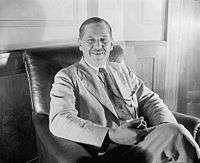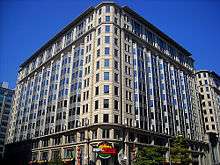Thurman Arnold
| Thurman Arnold | |
|---|---|
 | |
| Court of Appeals for the D. C. Circuit associate judge | |
|
In office March 18, 1943 – July 9, 1945 | |
| Nominated by | Franklin D. Roosevelt |
| Preceded by | Wiley B. Rutledge |
| Succeeded by | Bennett Champ Clark |
| Personal details | |
| Born |
Thurman Wesley Arnold June 2, 1891 Laramie, Wyoming |
| Died |
November 7, 1969 (aged 78) Alexandria, Virginia |
| Nationality | United States |
| Alma mater |
Princeton University Harvard Law School |
| Occupation | Lawyer |
Thurman Wesley Arnold (June 2, 1891 – November 7, 1969) was an iconoclastic Washington, D.C. lawyer. He was best known for his trust-busting campaign as Assistant Attorney General in charge of the Antitrust Division in Franklin Delano Roosevelt's Department of Justice from 1938 to 1943.[1] Before coming to Washington in 1938, Arnold was the mayor of Laramie, Wyoming, and then a professor at Yale Law School, where he took part in the legal realism movement, and published two books: The Symbols of Government (1935) and The Folklore of Capitalism (1937). A few years later, he published The Bottlenecks of Business (1940).
Life and career
Thurman was born in the frontier ranch town of Laramie, Wyoming, which grew to be a small city and location of the University of Wyoming. He was the son of Annie (Brockway) and Constantine Peter Arnold.[2] He began his university studies at Wabash College, but transferred to Princeton, earning his B.A. in 1911. He earned his law degree from Harvard Law School in 1914. He served in World War I, rising to the rank of lieutenant in the U.S. Army (Field Artillery) and worked briefly in Chicago before returning to Laramie, where he was a member of the Wyoming House of Representatives in 1921 and then mayor from 1923-1924.[1] He developed a reputation as a maverick lawyer.[1]
He was a Lecturer at the University of Wyoming from 1921 to 1926. He was dean of the College of Law at West Virginia University from 1927 to 1930. He was a visiting professor at Yale from 1930 to 1931; he was then a full professor of law there from 1931 to 1938. He was a special assistant to general counsel of the Agricultural Adjustment Administration in 1933. He was an assistant U.S. Attorney general of U.S. Department of Justice from 1938 to 1943.

As chief competition lawyer for the United States government, Arnold launched numerous studies to support the antitrust efforts in the late 1930s.[1] He targeted the American Medical Association in their anti-competitive efforts against health plans.[1] The Roosevelt administration later de-emphasized antitrust enforcements, for the stated purpose of allowing corporations to concentrate on contributing to victory in World War II.[1]
In 1943, Arnold was appointed as a judge of the United States Court of Appeals for the District of Columbia Circuit, succeeding Wiley B. Rutledge, who had been promoted to the U.S. Supreme Court. He was "kicked upstairs" by FDR to the Court of Appeals in order to get him out of the Antitrust division.[1] Although it had some responsibility for review of decisions by federal administrative agencies, during Arnold's tenure the court's primary role was reviewing decisions of local trial courts involving routine civil and criminal matters arising in Washington, D.C.. Arnold was never happy during his time on the court, resigning after only two years on the bench. As an explanation of his decision, he told observers he "would rather be speaking to damn fools than listening to damn fools." He returned to private practice in Washington, DC where, along with Paul A. Porter and Abe Fortas, he cofounded the law firm known today as Arnold & Porter.
Personal
Thurman married his lifelong partner Frances Longan Arnold on September 4, 1917. They had two children, Thurman Jr. and George, both of whom enjoyed successful careers in the law.
Thurman Arnold Jr. established a law firm in Palm Springs, California in 1953.[3] Thurman Arnold Jr.'s son, Thurman Arnold III,[4] joined his father's law firm in 1982 and is currently practicing law with an emphasis on Family Law in Palm Springs, California.
George married and raised a family with Elen Pearson, daughter of columnist Drew Pearson and granddaughter of Cissy Patterson, owner of the Washington Times-Herald.
Bibliography
References
- 1 2 3 4 5 6 7 Morgan, Ted (1985). FDR: A Biography. New York: Simon and Schuster. pp. 492, 664–665. ISBN 0-671-45495-1.
- ↑ http://politicalgraveyard.com/geo/CT/lions.html
- ↑ "Directory of Distinguished Attorneys Practice Areas". Retrieved 5 May 2013.
- ↑ "Thurman Arnold III". Retrieved 5 May 2013.
Biographical sources
- Arnold, Thurman. Fair Fights and Foul; a Dissenting Lawyer's Life.
- Arnold, Thurman (edited by Gressley, Gene M.). Voltaire and the Cowboy: The Letters of Thurman Arnold . ISBN 0-87081-073-1
- Gressley, Gene M. (1964). "Thurman Arnold, Antitrust, and the New Deal". The Business History Review 38 (2): 214–231. doi:10.2307/3112073. JSTOR 3112073.
- Miscamble, Wilson D. (1982). "Thurman Arnold Goes to Washington: A Look at Antitrust Policy in the Later New Deal". The Business History Review 56 (1): 1–15. doi:10.2307/3114972. JSTOR 3114972.
- Waller, Spencer Weber (2005). Thurman Arnold: A Biography. New York: New York University Press. ISBN 0-8147-9392-4.
- Thurman Arnold at the Biographical Directory of Federal Judges, a public domain publication of the Federal Judicial Center.
Primary sources
- Arnold, Thurman. The Bottlenecks of Business. New York: Reynal & Hitchcock, 1940. ISBN 1-58798-085-1
- Arnold, Thurman. The Folklore of Capitalism. New Haven: Yale University Press; London: Humphrey Milford/Oxford University Press, 1937. ISBN 1-58798-025-8
- Arnold, Thurman. The Symbols of Government. New Haven: Yale University Press, 1935
External links
| Legal offices | ||
|---|---|---|
| Preceded by Wiley Blount Rutledge |
Judge of the United States Court of Appeals for the District of Columbia Circuit 1943–1945 |
Succeeded by Bennett Champ Clark |
|